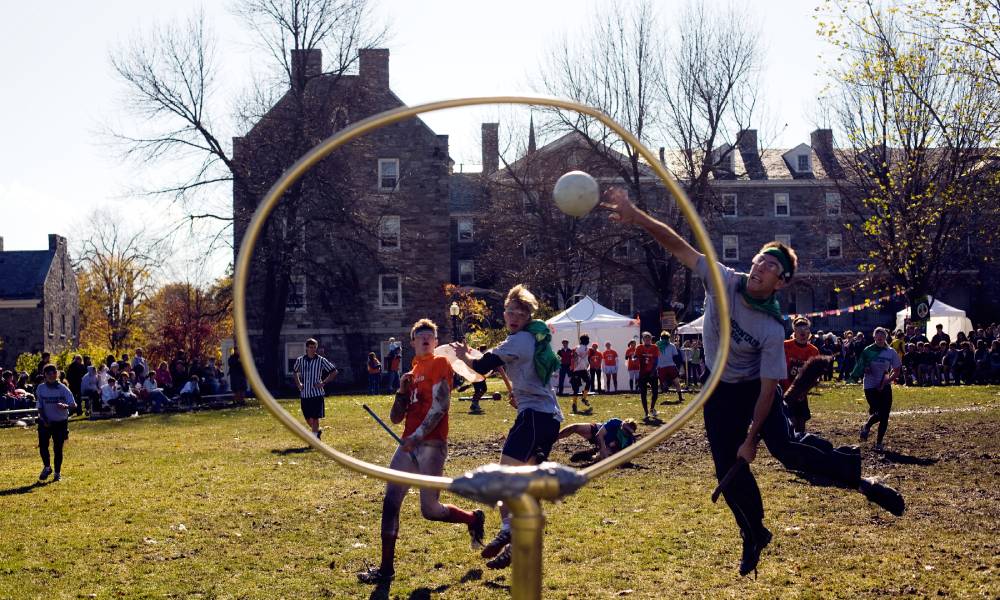Real-life sport of Quidditch changing name due to JK Rowling’s ‘anti-trans positions’

The Lowell Spinners held a pre-game Quidditch game between students from Emerson College and Boston University on 3 July 2013. (Yoon S Byun/The Boston Globe via Getty)
Real-life quidditch organisations are working to change the name of the sport to distance themselves from JK Rowling’s “anti-trans positions”.
The real-life game is inspired by the fictional game played by witches and wizards riding flying broomsticks in the Harry Potter franchise. The real-life sport was created in 2005 at Middlebury College in Vermont and is now played around the world.
US Quidditch (USQ) and Major League Quidditch (MLQ) said in a joint news release that they will be dropping the now-famous name, citing Rowling’s “anti-trans positions” as a driving factor behind the name change. A new name has yet to be decided.
“The leagues are hoping a name change can help them continue to distance themselves from the works of JK Rowling, the author of the Harry Potter book series, who has increasingly come under scrutiny for her anti-trans positions in recent years,” the leagues said.
The USQ and MLQ said that the sport has “developed a reputation as one of the most progressive sports in the world on gender equality and inclusivity”, citing its “gender maximum rule”.
The sport sees two teams of seven players mount non-flying broomsticks and run around a large pitch. The players attempt to score points by tossing a ball through three hoops of varying heights at either end of the pitch.
The sport’s “gender maximum rule” stipulates that a team “may not have more than four players who identify as the same gender in play at any point during the game”.
“Both organisations feel it is imperative to live up to this reputation in all aspects of their operations and believe this move is a step in that direction,” the statement added.

Middlebury College hosted the first large Intercollegiate Quidditch Tournament. (Getty/Christopher Capozziello)
The International Quidditch Association, the sport’s governing body, also lists inclusivity as one of the sport’s values.
The website states: “As a community we want our sport to be inclusive of people of different ethnicities, cultural backgrounds, ages, languages, gender, sexual orientations.
“A key demonstration of this is the Gender Rule in quidditch, whereby players are able to play as the gender that they identify as including non-binary genders.”
Alex Benepe, one of the founders of the real-life sport, said he was “thrilled” that the leagues are “moving in this direction”.
“Big changes like this don’t come without risk, but I’ve been a strong advocate for making this move for a long time,” Benepe said. “The sport needs its own space without limits on its growth and changing the name is crucial to achieving that.”
The USQ and MLQ added that the name change could also open up sponsors to sponsorships and broadcast opportunities that aren’t currently available because Warner Bros holds the trademark on “quidditch”.
Mary Kimball, executive director of USQ, said the sport is “at a turning point” where it can “continue the status quo and stay relatively small” or try to “make big moves and really propel this sport forward”.
“Renaming the sport opens up so many more revenue opportunities for both organisations, which is crucial to expansion,” Kimball said.
JK Rowling has stirred repeated controversy for sharing her views on trans lives.
In 2019, she voiced her support for a woman who pursued legal action to have “gender-critical views” protected under the UK Equalities Act.
The following year, in a June 2020 tweet, Rowling blasted an op-end that used gender-neutral phrases.
Rowling also published a lengthy essay on her website where she laid out her views on trans lives. She claimed in the essay that she had “deep concerns” about the “effect that the trans rights movement” was having on the education and safeguarding of children.
On Sunday (12 December), the Harry Potter author remarked on reports of a Police Scotland chief saying the force would not misgender trans people accused of rape in light of new self-ID proposals.
“War is Peace. Freedom is Slavery. Ignorance is Strength. The Penised Individual Who Raped You Is a Woman,” Rowling wrote on Twitter.
Her tweet was immediately met with harsh criticism, and Queer Eye icon Jonathan Van Ness accused the author of “cherry-picked vitriol”.
“The biggest threats of violence against women has always been cisgender men,” he wrote in a tweet. “Not trans women, unless JK’s constant transphobic cherry-picked vitriol convinces you otherwise.”
Van Ness continued: “But as trans women are assaulted, deprived of work, killed, and raped JK is safe in her mansion.”
Rowling’s repeated comments about the trans community have prompted waves of backlash from the UK’s trans community, Harry Potter fans, stars from the Harry Potter film franchise and even Wonder Woman star Lynda Carter.

